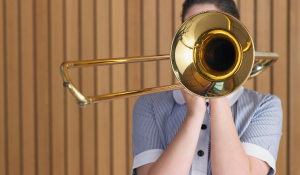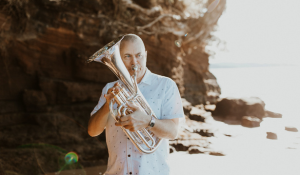
A great band director is the start to a great music education. However every great band director knows a great private teacher will lead their students to the next level. These private teachers are carefully chosen by band directors because they can mold the future success of each of their students and encourage the growth of their band programs.
So what is a band director looking for in a great private teacher?

In his web series Comedians in Cars Getting Coffee, Jerry Seinfeld says of performing: “I don’t accept the judging of process. It doesn’t matter [how you prepare]. We’re all trying to get to the same island. Whether you, swim, fly, surf, or skydive in, it doesn’t matter. What matters is when the red light comes on.”

We followed up with Band Director Justin Antos, Director of Bands at Dwight Eisenhower High School, after he switched his full marching band section from their stock mouthpieces to Denis Wick Mouthpieces. Learn about the struggles that lead up to this switch, and what differences they experienced when the whole brass section was playing on new mouthpeices in this interview with Justin.

"Is a trumpet or trombone mute more than it's shape?" Logically the answer is yes. However in the manufacturing world, it is a bit more of a gray area. Low-priced student mutes have become as numerous as flavors of ice cream these days. So how do you define quality? How do you differentiate between mute functioned and mute shaped?

When do I need to find a new mouthpiece?
After a student has learned how to make a sound on their new brass instrument, and make it consistently, their next focus is on improving that sound. Since sound starts with the mouthpiece, your first upgrade should logically be the mouthpiece. But when and how do you find the right one? Use these tips to understand the process and help you student take their fist steps to expanding their sound and skills.

There are multiple low brass instruments that can easily be played using a standard trombone mouthpiece. While trombone mouthpieces can be used for baritone, the issue that cannot be overlooked is the trombone mouthpiece was designed for the trombone, not the baritone. Learn about Denis Wick artist Steven Booth's journey to his current Denis Wick baritone mouthpiece.

Tom Hutchinson, world renowned brass band cornetist, has had a love for cornet since his youth. Find out more about Tom's biography in this recent interview. Over the years of performances, wins, and losses, Tom has gained a lot of experience which he shared during a recent clinic at the the British Bandsman at Reading Town Hall before a concert performed by The Cory Band where Tom holds the principal Cornet position. Here are 3 tips he shared about finding the right mouthpiece for your needs.



